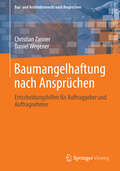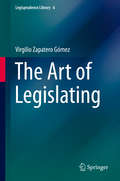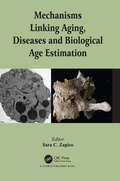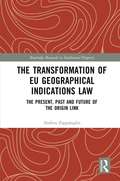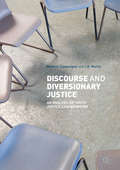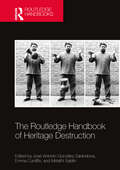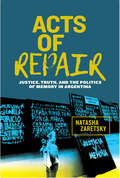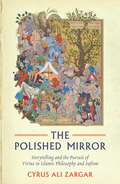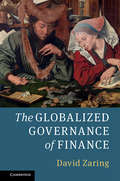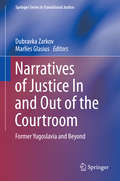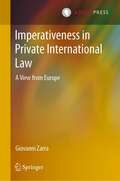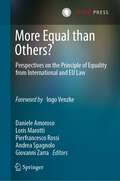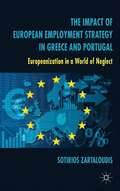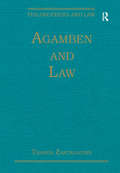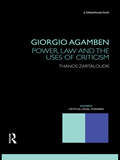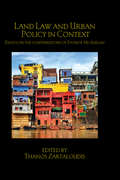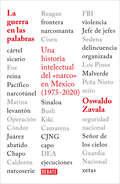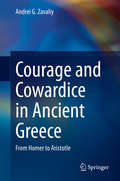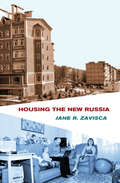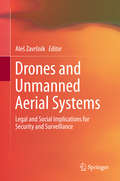- Table View
- List View
Abnahme im Bauwesen nach Ansprüchen: Entscheidungshilfen für Auftraggeber und Auftragnehmer für die Abnahme von Bauleistungen, Planung, Bauüberwachung, Projektleitung, Projektsteuerung und Bauträgerleistungen (Bau- und Architektenrecht nach Ansprüchen)
by Christian Zanner Jana HenningDieses Buch unterstützt den Immobilienentwickler und alle am Bau Beteiligten im Umgang mit der nicht immer einfachen Thematik der Abnahme. Welche Formen der Abnahme gibt es? Richtet sie sich nach dem BGB oder der VOB? Welche Besonderheiten gibt es im Architekten- und Ingenieurrecht zu beachten? Wie ist die Abnahme beim Bauträgervertrag zu handhaben? Wann kann eine Teilabnahme gefordert werden und wann kann die Abnahme verweigert werden? Die Abnahme ist in der Baupraxis von herausragender Bedeutung. Das Verständnis der einzelnen Tatbestände und der Wirkung der Abnahme ist für den Immobilienentwickler, Auftraggeber, Architekten, Ingenieure und Bauunternehmen für die Praxis unerlässlich. Die neue VOB/B 2016 ist bereits berücksichtigt worden und im Wortlaut beigefügt.
Baumangelhaftung nach Ansprüchen: Entscheidungshilfen für Auftraggeber und Auftragnehmer (Bau- und Architektenrecht nach Ansprüchen)
by Christian Zanner Daniel WegenerDieses Fachbuch behandelt umfassend und praxisnah die aus einem Bauvertrag resultierenden Rechte im Zusammenhang mit Baumängeln. Dabei werden die Ansprüche aus Sicht aller an der Realisierung eines Bauprojekts Beteiligter dargestellt. Möglichkeiten der gerichtlichen und außergerichtlichen Durchsetzung von Ansprüchen werden aufgezeigt, der Begriff des "Mangels" wird ausführlich erläutert und bietet damit dem Bau-Praktiker konkrete Hilfestellung.
The Art of Legislating (Legisprudence Library #6)
by Virgilio Zapatero GómezAny contemporary state presents itself as committed to the “rule of law”, and this notion is perhaps the most powerful political ideal within the current global discourse on legal and political institutions. Despite being a contested concept, the rule of law is generally recognised as meaning that government is bound in all its actions by fixed and public rules, and that these rules respect certain formal requirements and are enforced by an independent judiciary. This book focuses on formal legality and the question of how to achieve good laws—a topic that was famously addressed by the 18th century enlightened thinkers, but also by prominent legal scholars of our time. Historically, the canon of “good legislation” demanded generality, publicity and accessibility, and comprehensibility of laws; non-retroactivity; consistency; the possibility of complying with legal obligations and prohibitions; stability; and congruency between enacted laws and their application. All these are valuable ideals that should not be abandoned in today’s legal systems, particularly in view of the silent revolution that is transforming our legality-based “states of law” into jurisdictional states. Such ideals are still worth pursuing for those who believe in representative democracy, in the rule of law and in the dignity of legislation. The idea for the book stemmed from the author’s parliamentary and governmental experience; he was responsible for the Government of Spain’s legislative co-ordination from 1982 to 1993, which were years of intensive legislative production. The more than five hundred laws (and thousands of decrees) elaborated in this period profoundly changed all sectors of the legal order inherited from Franco’s dictatorship, and laid the foundations of a new social and democratic system. For an academic, this was an exciting experience, which offered a unique opportunity to put the theory of legislation to the test. Reflecting and elaborating on this experience, the book not only increases scholarly awareness of how laws are made, but above all, improves the quality of legislation and as a result the rule of law.
Mechanisms Linking Aging, Diseases and Biological Age Estimation
by Sara C. ZapicoThis book focuses on four of the hallmarks of aging: aspartic acid racemization, advanced glycation end products, telomere shortening and mitochondrial mutations; describing their role in aging and diseases; and their application to age-at-death estimation in forensic sciences in greater depth, displaying the interconnecting pathways among these processes. An additional chapter related to Epigenetics and its role in aging, diseases, and forensic age estimation is also included. This book is aimed at a broad audience: from students being introduced to aging, diseases, and forensic science research to scientists in biomedicine and forensics complementing their knowledge in their respective fields while also increasing their knowledge in other disciplines.
The Transformation of EU Geographical Indications Law: The Present, Past and Future of the Origin Link (Routledge Research in Intellectual Property)
by Andrea ZappalaglioLinking traditional and local products to a specific area is increasingly felt as a necessity in a globalised market, and Geographical Indications (GIs) are emerging as a multifunctional tool capable of performing this and many other functions. This book analyses the evolving nature of EU sui generis GIs by focusing on their key element, the origin link, and concludes that the history of the product in the broad sense has become a major factor to prove the link between a good and a specific place. For the first time, this area of Intellectual Property Law is investigated from three different, although interrelated, perspectives: the history and comparative assessment of the systems of protection of Indications of Geographical Origin adopted in the European jurisdictions from the beginning of the 20th century; the empirical analysis of the trends emerging from the practice of EUGIs; and the policy debates surrounding them and their importance for the fulfilment of the general goals of the EU Common Agricultural Policy. The result is an innovative and rounded analysis of the very nature of the EU Law of GIs that, starting from its past, investigates the present and the likely future of this Intellectual Property Right. This book provides an interesting and innovative contribution to the field and will be of interest to GI scholars and Intellectual Property students, as well as anyone willing to gain a better understanding of this compelling area of law.
Discourse and Diversionary Justice
by Michele Zappavigna Jr MartinThis book analyses the Youth Justice Conferencing Program in New South Wales, Australia. Exploring this form of diversionary justice from the perspectives of functional linguistics and performance studies, the authors combine close textual analysis with ethnographic research methodologies. They examine how participants use the discourse semantic resources available to them to achieve such outcomes as reparation for the victim, reintegration of the offender into the community, and reconciliation between the various parties. This uniquely-researched work is sure to be of interest to students and scholars of applied linguistics, sociolinguistics and discourse analysis.
The Routledge Handbook of Heritage Destruction (Routledge Handbooks on Museums, Galleries and Heritage)
by Zarandona, José Antonio González Emma Cunliffe Melathi SaldinThe Routledge Handbook of Heritage Destruction presents a comprehensive view on the destruction of cultural heritage and offers insights into this multifaceted, interdisciplinary phenomenon; the methods scholars have used to study it; and the results these various methods have produced. By juxtaposing theoretical and legal frameworks and conceptual contexts alongside a wide distribution of geographical and temporal case studies, this book throws light upon the risks, and the realizations, of art and heritage destruction. Exploring the variety of forces that drive the destruction of heritage, the volume also contains contributions that consider what forms heritage destruction takes and in which contexts and circumstances it manifests. Contributors, including local scholars, also consider how these drivers and contexts change, and what effect this has on heritage destruction, and how we conceptualise it. Overall, the book establishes the importance of the need to study the destruction of art and cultural heritage within a wider framework that encompasses not only theory but also legal, military, social, and ontological issues. The Routledge Handbook of Heritage Destruction will contribute to the development of a more complete understanding and analysis of heritage destruction. The Handbook will be useful to academics, students, and professionals with interest in heritage, conservation and preservation, history and art history, archaeology, anthropology, philosophy, and law.
Acts of Repair: Justice, Truth, and the Politics of Memory in Argentina (Genocide, Political Violence, Human Rights)
by Natasha ZaretskyActs of Repair explores how ordinary people grapple with political violence in Argentina, a nation home to survivors of multiple genocides and periods of violence, including the Holocaust, the political repression of the 1976-1983 dictatorship, and the 1994 AMIA bombing. Despite efforts for accountability, the terrain of justice has been uneven and, in many cases, impunity remains. How can citizens respond to such ongoing trauma? Within frameworks of transitional justice, what does this tell us about the possibility of recovery and repair? Turning to the lived experience of survivors and family members of victims of genocide and violence, Natasha Zaretsky argues for the ongoing significance of cultural memory as a response to trauma and injustice, as revealed through testimonies and public protests. Even if such repair may be inevitably liminal and incomplete, their acts seeking such repair also yield spaces for transformation and agency critical to personal and political recovery. Author website (www.natashazaretsky.com)
Polished Mirror: Storytelling and the Pursuit of Virtue in Islamic Philosophy and Sufism
by Cyrus Ali ZargarIslamic philosophy and Sufism evolved as distinct yet interweaving strands of Islamic thought and practice. Despite differences, they have shared a concern with the perfection of the soul through the development of character. In The Polished Mirror, Cyrus Ali Zargar studies the ways in which, through teaching and storytelling, pre-modern Muslims lived, negotiated, and cultivated virtues. Examining the writings of philosophers, ascetics, poets, and saints, he locates virtue ethics within a dynamic moral tradition. Innovative, engaging, and approachable, this work – the first in the English language to explore Islamic ethics in the fascinating context of narrative – will be a valuable resource for both students and scholars.
The Globalized Governance of Finance
by David ZaringBig banks are capable of wreaking havoc on the global economy, and governments have often felt powerless to stop them. Regulators have responded by developing coordinated programs to handle banks, insurers, broker dealers, shadow banks and other businesses that can blow up in a crisis. This program began informally and undemocratically, and has developed into something much more organized, formalized and predictable, even though it has never been legally enforceable. David Zaring examines the realities of the current international financial system and concludes that in fact this is a well-ordered and functioning regulatory environment: the international financial system enjoys a substantial degree of compliance, and operates predictably and harmoniously. As a result, perhaps this could serve as a paradigm for future global governance. Zaring explores three aspects of international financial regulation that can inform global governance: harmonization through rules, cooperation on enforcement and agreement on fundamental principles.
Legal Literacy: An Introduction to Legal Studies
by Archie ZariskiTo understand how the legal system works, students must consider the law in terms of its structures, processes, language, and modes of thought and argument—in short, they must become literate in the field. Legal Literacy fulfills this aim by providing a foundational understanding of key concepts such as legal personhood, jurisdiction, and precedent, and by introducing students to legal research and writing skills. Examples of cases, statutes, and other legal materials support these concepts. While Legal Literacy is an introductory text, it also challenges students to consider critically the system they are studying. Touching on significant socio-legal issues such as access to justice, legal jargon, and plain language, Zariski critiques common legal traditions and practices, and analyzes what it means “to think like a lawyer.” As such, the text provides a sound basis for those who wish to pursue further studies in law or legal studies as well as those seeking a better understanding of how the legal field relates to the society that it serves.
Narratives of Justice In and Out of the Courtroom
by Dubravka Zarkov Marlies GlasiusThis volume considers the dynamic relations between the contemporary practices of international criminal tribunals and the ways in which competing histories, politics and discourses are re-imagined and re-constructed in the former Yugoslavia and beyond. There are two innovative aspects of the book - one is the focus on narratives of justice and their production, another is in its comparative perspective. While legal scholars have tended to analyze transitional justice and the international war tribunals in terms of their success or failure in establishing the facts of war crimes, this volume goes beyond mere facts and investigates how the courts create a symbolic space within which competing narratives of crimes, perpetrators and victims are produced, circulated and contested. It analyzes how international criminal law and the courts gather, and in turn produce, knowledge about societies in war, their histories and identities, and their relations to the wider world. Moreover, the volume situates narratives of transitional justice in former Yugoslavia both within specific national spaces - such as Serbia, and Bosnia - and beyond the Yugoslav. In this way it also considers experiences from other countries and other times (post-World War II) to offer a sounding board for re-thinking the meanings of transitional justice and institutions within former Yugoslavia. Included in the volume's coverage is a look at the Rwandan tribunals, the trials of Charles Taylor, Radovan Karadzic, the Srebrenica genocide, and other war crimes and criminals in the Yugoslav. Finally, it frames all of those narratives and experiences within the global dynamics of legal, social and geo-political transformations, making it an excellent resource for social science researchers, human rights activists, those interested in the former Yugoslavia and international relations, and legal scholars.
Imperativeness in Private International Law: A View from Europe
by Giovanni ZarraThis book centres on the ways in which the concept of imperativeness has found expression in private international law (PIL) and discusses “imperative norms”, and “imperativeness” as their intrinsic quality, examining the rules or principles that protect fundamental interests and/or the values of a state so as to require their application at any cost and without exceptions. Discussing imperative norms in PIL means referring to international public policy and overriding mandatory rules: in this book the origins, content, scope and effects of both these forms of imperativeness are analyzed in depth. This is a subject deserving further study, considering that very divergent opinions are still emerging within academia and case law regarding the differences between international public policy and overriding mandatory rules as well as with regard to their way of functioning.By using an approach mainly based on an analysis of the case law of the CJEU and of the courts of the various European countries, the book delves into the origin of imperativeness since Roman law, explains how imperative norms have evolved in the different conceptions of private international law, and clarifies the foundation of the differences between international public policy and overriding mandatory rules and how these concepts are used in EU Regulations on PIL (and in the practice related to these sources of law). Finally, the work discusses the influence of EU and public international law sources on the concept of imperativeness within the legal systems of European countries and whether a minimum content of imperativeness – mainly aimed at ensuring the protection of fundamental human rights in transnational relationships – between these countries has emerged. The book will prove an essential tool for academics with an interest in the analysis of these general concepts and practitioners having to deal with the functioning of imperative norms in litigation cases and in the drafting of international contracts. Giovanni Zarra is Assistant professor of international law and private international law and transnational litigation in the Department of Law of the Federico II University of Naples.
More Equal than Others?: Perspectives on the Principle of Equality from International and EU Law
by Giovanni Zarra Pierfrancesco Rossi Daniele Amoroso Loris Marotti Andrea SpagnoloThis book analyses the principle of equality from three perspectives: public international law, private international law and EU law. It is the first book in English providing a comprehensive overview of this principle in these areas of law and showing the current trends and issues concerning its application. Its main goal is to understand whether and to what extent the principle of equality has been affirmed in public and private international law, as well as EU law, and what – if any – the common core of this principle is.The analysis carried out in this contributed volume starts from general analyses of the principle of equality in the areas of the law covered by the book and then discusses the principle in more specific areas, such as human rights law, international adjudication (including investment law) and the law of international organizations. The book is intended to become a benchmark for academics dealing with matters of equality in public international law, private international law and EU law. It will be a useful tool for practitioners too, the collected chapters being based on the relevant case law dealing with the principle of equality. Daniele Amoroso is Professor of International Law in the Department of Law of the University of Cagliari, Cagliari, Italy. Loris Marotti is Assistant Professor of International Law in the Department of Law at the Federico II University of Naples, Italy. Pierfrancesco Rossi is Postdoctoral Fellow in International Law in the Department of Law of Luiss University, Rome, Italy. Andrea Spagnolo is Professor of International Law in the Department of Law of the University of Turin, Turin, Italy. Giovanni Zarra is Professor of International Law and International Litigation in the Department of Law at the Federico II University of Naples, Italy.
The Impact of European Employment Strategy in Greece and Portugal
by Sotirios ZartaloudisThrough the new use of new empirical evidence derived from analysing employment services, gender equality policies and flexicurity in Greece and Portugal, this book provides compelling new insights into how European Employment Strategy (EES) can influence the domestic employment policy of European Union member states.
Agamben and Law: Power, Law And The Uses Of Criticism (Philosophers And Law Ser.)
by Thanos ZartaloudisThis collection of articles brings together a selection of previously published work on Agamben‘s thought in relation to law and gathered from within the legal field and theory in particular. The volume offers an exemplary range of varied readings, reflections and approaches which are of interest to readers, students and researchers of Agamben‘s law-related work.
Giorgio Agamben: Power, Law and the Uses of Criticism (Nomikoi: Critical Legal Thinkers)
by Thanos ZartaloudisGiorgio Agamben: Power, Law and the Uses of Criticism is a thorough engagement with the thought of the influential Italian philosopher Giorgio Agamben. It explores Agamben’s work on language, ontology, power, law and criticism from the 1970s to his most recent publications. Introducing Agamben's work to a readership in legal theory, as well as in the humanities and social sciences more generally, Thanos Zartaloudis argues that an adequate understanding of Agamben's Homo Sacer project requires an attention to his earlier philosophical writings on language, ontology, power and time. It is through this attentive and creative analysis of Agamben's work that Zartaloudis here presents a rethinking of the ideas of justice and criticism.
Land Law and Urban Policy in Context: Essays on the Contributions of Patrick McAuslan (Birkbeck Law Press)
by Thanos ZartaloudisThis book is a collection of essays honouring and engaging with the work of the late Professor Patrick McAuslan. It is a collection that narrates, analyses and critiques McAuslan’s contributions, as well as offering substantive perspectives on how his work has impacted the legal fields in which he was involved: including those of land law, urban planning law and policy, land use and participation in developing countries, democratic constitutionalism, and legal education. The essays present McAuslan’s contributions in the contexts in which they emerged, and according to both the circumstances and motivations that shaped them, as well as the challenges they encountered. It thus provides an ideal point of engagement for scholars, students and policy makers that have already interacted with McAuslan’s ideas and work, or who have yet to do so.
Gain-based Remedies for Breach of Contract: A Comparative Analysis of English and Polish Law
by Daniel ZatorskiThis book focuses on an emerging problem in English contract law: what should be done when a party has been unjustly enriched as the result of a breach of contract but there is no measurable loss suffered by said party? Two rulings are at the heart of the book: Wrotham Park Estate v Parkside Homes and Attorney-General v Blake. These two cases can be said to have established gain-based remedies in English contract law. However, the principles that underpin these remedies are not entirely clear and are subject to debate.This book analyses these principles through the lens of compensatory and restitutionary approaches. Moreover, it applies a comparative analysis of these approaches through the lens of the civil law jurisdiction in Poland.Since the term ‘compensation’ is not a universal concept, the book distinguishes between two rationales in the compensatory analysis. The first, reparative compensation, is defined as a form of monetary recompense for loss or damage actually suffered. The second, substitutive compensation, represents a monetary equivalent to a right that a person has been deprived of or denied. Both rationales require the application of a broad notion of loss in order to make gain-based remedies workable in both English and Polish law.In contrast, ‘restitution’ states that a person cannot be permitted to profit from their own wrongdoing. Based on this principle, the book argues that gain-based remedies could be applied under Polish law through the rules of unjust enrichment. However, in order to do so, a broader understanding of the subtraction prerequisite (the enrichment being at the aggrieved party’s expense) would have to be adopted. The book concludes that unjust enrichment is a more natural way of implementing gain-based remedies in civil law jurisdictions.
Punishing Immigrants: Policy, Politics, and Injustice (New Perspectives in Crime, Deviance, and Law #15)
by Marjorie S. Zatz Ramiro Martínez Charis E. KubrinArizona's controversial new immigration bill is just the latest of many steps in the new criminalization of immigrants. While many cite the presumed criminality of illegal aliens as an excuse for ever-harsher immigration policies, it has in fact been well-established that immigrants commit less crime, and in particular less violent crime, than the native-born and that their presence in communities is not associated with higher crime rates. Punishing Immigrants moves beyond debunking the presumed crime and immigration linkage, broadening the focus to encompass issues relevant to law and society, immigration and refugee policy, and victimization, as well as crime. The original essays in this volume uncover and identify the unanticipated and hidden consequences of immigration policies and practices here and abroad at a time when immigration to the U.S. is near an all-time high. Ultimately, Punishing Immigrants illuminates the nuanced and layered realities of immigrants' lives, describing the varying complexities surrounding immigration, crime, law, and victimization. Podcast: Susan Bibler Coutin, on the process and effects of deportation --Listen here.
La guerra en palabras
by Oswaldo ZavalaUna historia intelectual de la hegemonía que funcionó como la plataforma para lanzar la “guerra contra el narco”: primero desde un plano simbólico y después como una campaña permanente de violencia organizada. Basado en una investigación de archivos oficiales, reportajes periodísticos, estudios académicos y producciones culturales sobre el tráfico de drogas, Oswaldo Zavala revisa el arco histórico del lenguaje en el que se inscriben un relato de guerra con personajes intercambiables en lugares variables que configuran la ilusión sobre el “narco” en nuestra sociedad contemporánea, con atención especial en los productos culturales sobre el tráfico de drogas en general. .
Courage and Cowardice in Ancient Greece: From Homer to Aristotle
by Andrei G. ZavaliyThe book offers the first comprehensive account of the debate on true courage as it was raging in ancient Greece, from the times when the immensely influential Homeric epics, the Iliad and the Odyssey, were composed, to the period of the equally influential author, Aristotle. The many voices that contribute to this debate include poets, authors of ancient dramas and comedies, historians, politicians and philosophers. The book traces the origin of the earliest ideal of a courageous hero in the epic poems of Homer (8th century BCE), and faithfully records its transformations in later authors, which range from an emphatic denial of the Homeric standards of courage (as in comedies of Aristophanes and some Dialogues of Plato) to the strong revisionist tendencies of Aristotle, who attempts to restore genuine courage to its traditional place as an exclusively martial, male virtue.Without attempting to cover the whole of the Western history, the book is able to explore the most important primary Greek sources on the subject matter in greater details, and provide the reader with a comprehensive picture of the changes in both popular and philosophical conceptualizations of the standards of courage from the Archaic period to the middle of the 4th century BCE. A deeper understanding of the history of the debate on courage should help to shape the modern discussions as well, as it becomes obvious that many of the questions on courage and cowardice that are still raised by the contemporary authors from different fields, have been thoroughly considered during the early stages of Greek culture. The book seeks to undermine a common stereotype of a single, unified view on courage and cowardice in Ancient Greece and shows that the current debates on what constitutes genuine courageous character can be traced to the various direct and indirect discussions on this subject matter by the ancient authorities.
Public Branding and Marketing: A Global Viewpoint
by Staci M. ZavattaroThis edited volume details public branding and marketing from a global, comparative perspective. Place branding and marketing practices are now prominent in cities, states, nations, regions, and organizations all over the world. While disciplines such as hospitality management, tourism marketing, and business marketing have made inroads into understanding the intricacies of place branding, research in public administration and policy is still emerging. This volume fills that research gap. Including accounts from both the academic and practitioner communities, this book bridges the academic-practitioner divide and provides a holistic account of branding and marketing in public organizations as well as immediate application and lessons learned. The book takes an explicit public administration approach, focusing on a wide range of topics such as branding leadership, co-creation, stakeholder engagement, education, non-profit marketing and branding, and city administration. The book is divided into four sections. Section I highlights the process of developing and communicating public branding and marketing efforts. Section II focuses specifically on how social media and other digital technologies are used to communicate and evaluate place branding strategies. Section III centers on branding at the local government level. Section IV highlights how various stakeholder groups come together (or not) when participating in strategic branding efforts. Presenting various methodologies, approaches, and implications of place branding and marketing across differing social, cultural, political, and economic conditions, this book will be of use to scholars and students in public. administration, tourism studies, and business administration as well as professionals and practitioners in the public branding and marketing field.
Housing The New Russia
by Jane R. ZaviscaIn Housing the New Russia, Jane R. Zavisca examines Russia's attempts to transition from a socialist vision of housing, in which the government promised a separate, state-owned apartment for every family, to a market-based and mortgage-dependent model of home ownership. In 1992, the post-Soviet Russian government signed an agreement with the United States to create the Russian housing market. The vision of an American-style market guided housing policy over the next two decades. Privatization gave socialist housing to existing occupants, creating a nation of homeowners overnight. New financial institutions, modeled on the American mortgage system, laid the foundation for a market. Next the state tried to stimulate mortgages-and reverse the declining birth rate, another major concern-by subsidizing loans for young families. Imported housing institutions, however, failed to resonate with local conceptions of ownership, property, and rights. Most Russians reject mortgages, which they call "debt bondage," as an unjust "overpayment" for a good they consider to be a basic right. Instead of stimulating homeownership, privatization, combined with high prices and limited credit, created a system of "property without markets. " Frustrated aspirations and unjustified inequality led most Russians to call for a government-controlled housing market. Under the Soviet system, residents retained lifelong tenancy rights, perceiving the apartments they inhabited as their own. In the wake of privatization, young Russians can no longer count on the state to provide their house, nor can they afford to buy a home with wages, forcing many to live with extended family well into adulthood. Zavisca shows that the contradictions of housing policy are a significant factor in Russia's falling birth rates and the apparent failure of its pronatalist policies. These consequences further stack the deck against the likelihood that an affordable housing market will take off in the near future.
Drones and Unmanned Aerial Systems
by Aleš ZavršnikThis book tackles the regulatory issues of Unmanned Aerial Systems (UAS) or Remotely-Piloted Aerial Systems (RPAS), which have profound consequences for privacy, security and other fundamental liberties. Collectively known as "drones," they were initially deployed for military purposes: reconnaissance, surveillance and extrajudicial executions. Today, we are witnessing a growth of their use into the civilian and humanitarian domain. They are increasingly used for goals as diverse as news gathering, aerial inspection of oil refinery flare stacks, mapping of the Amazonian rain-forest, crop spraying and search and rescue operations. The civil use of drones is becoming a reality in the European Union and in the US. The drone revolution may be a new technological revolution. Proliferation of the next generation of "recreational" drones show how drones will be sold as any other consumer item. The cultural perception of the technology is shifting, as drones are increasingly being used for humanitarian activities, on one hand, but they can also firmly be situated in the prevailing modes of postmodern governance on the other hand. This work will be of interest to researchers in Criminology and Criminal Justice interested in issues related to surveillance, security, privacy, and technology. It will also provide a criminological background for related legal issues, such as privacy law, aviation law, international criminal law, and comparative law.

